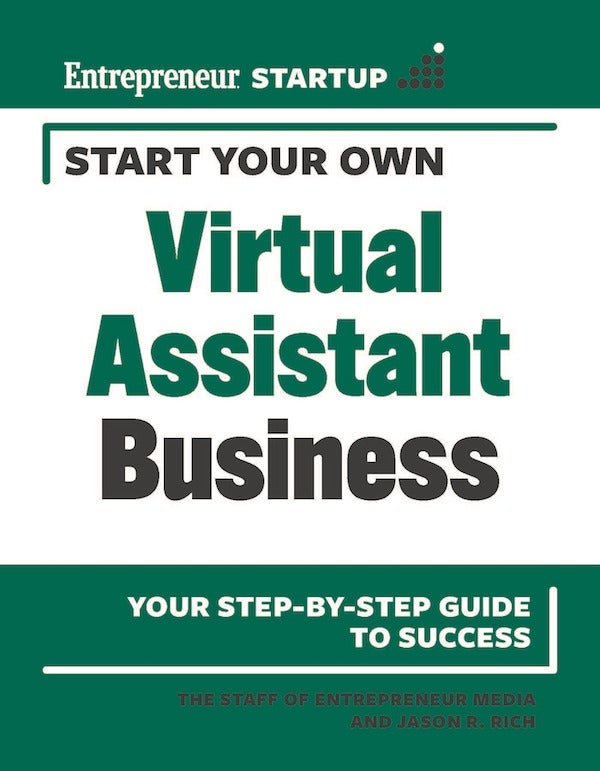How to Make Thousands of Dollars on the Side As a Virtual Assistant
Apply your skills and experience to create a lucrative virtual assistant side hustle or full-time business.

Opinions expressed by Entrepreneur contributors are their own.
In the new book How to Start Your Own Virtual Assistant Business, author Jason R. Rich and the staff of Entrepreneur have outlined everything you need to know to launch a lucrative side hustle or full-time business. In the following excerpt, Rich breaks down the basics of why this is the ideal time to use your skills and experience to create a new revenue stream.
Why be a virtual assistant now?
While virtual assistants have been around as long as the internet, these positions are now more diverse in terms of their responsibilities and more widely accepted than ever. In 2021 and beyond, working as a virtual assistant (or VA) can be an incredibly prosperous career path.
Every day, clients hire virtual assistants to complete a broad range of both common and highly specialized tasks. If you have specialized skills and/or experience in writing, bookkeeping/accounting, social media marketing, web design, travel planning/coordination, telemarketing, executive administration, data entry, booking appointments/scheduling, project management, database management, or research, for example, you can earn a higher-income than a VA who handles more general or administrative tasks for clients. As a virtual assistant, set yourself apart from your competition by developing a niche.
Related: How to Start Your Own Virtual Assistant Business on sale now
Cindy Opong, the founder of Creative Assistants, explains her business, “In my opinion, the role of a virtual assistant is to support and, in some cases, run the back end of a client’s business, so they can focus their time and effort on what they’re really good at. I personally specialize in working with [former] top-level executives with corporations who are now starting or running their own consulting businesses. These people were used to having an executive assistant in the corporate space, and many don’t know how to handle core tasks that an executive assistant would typically handle. I come in and I take up that role remotely for them.”
How much can you make as a virtual assistant?
In 2020, the Association of Virtual Assistants conducted a survey of more than 500 working virtual assistants for its VA State of the Industry Report. In the survey, 93 percent of respondents said they “enjoy[ed] freedom and flexibility” working as VAs.
The report also found that 38 percent of respondents worked 20 to 30 hours per week, while 26 percent said they worked more than 40 hours, 24 percent worked 10 to 20 hours, and 11 percent worked 1 to 10 hours.
When it came to hourly rates, the report stated that 58 percent of virtual assistants earn $26 to $50 per hour, 23 percent earn $10 to $25 per hour, 18 percent earn $51 to $100 per hour, and just 1 percent earn more than $100 per hour.
In terms of monthly income, 33 percent reported making between $2,001 and $5,000 per month, 26 percent made between $1,001 and $2,000, 16 percent made between $0 and $500, 14 percent made between $551 and $1,000, and 11 percent made more than $5,000.
Related: Check out what the Entrepreneur Bookstore’s discount section
What you’ll need
One of the biggest benefits of being a virtual assistant is that your location rarely matters to your clients, as long as you’re accessible during their business hours and finish your work on time. However, some clients do prefer VAs who live and work in their time zone, even though they may never meet in person. Working as an independent contractor from your home office makes you your own boss. You set your rates, determine the number of hours you’re willing to work each week and create your daily schedule. As a business operator, you’re also in charge of:
- Finding and managing your clients
- Marketing and promoting your business (online and in the real world) P Handling the bookkeeping and accounting
- Billing (and collecting on overdue invoices)
- Keeping your skill set up-to-date
- Meeting your deadlines
How do you get started?
Pick up How to Start Your Own Virtual Assistant Business available now for a fully-detailed guide to setting up your business, finding customers, and turning your expertise into a new revenue stream.
In the new book How to Start Your Own Virtual Assistant Business, author Jason R. Rich and the staff of Entrepreneur have outlined everything you need to know to launch a lucrative side hustle or full-time business. In the following excerpt, Rich breaks down the basics of why this is the ideal time to use your skills and experience to create a new revenue stream.
Why be a virtual assistant now?
While virtual assistants have been around as long as the internet, these positions are now more diverse in terms of their responsibilities and more widely accepted than ever. In 2021 and beyond, working as a virtual assistant (or VA) can be an incredibly prosperous career path.
Every day, clients hire virtual assistants to complete a broad range of both common and highly specialized tasks. If you have specialized skills and/or experience in writing, bookkeeping/accounting, social media marketing, web design, travel planning/coordination, telemarketing, executive administration, data entry, booking appointments/scheduling, project management, database management, or research, for example, you can earn a higher-income than a VA who handles more general or administrative tasks for clients. As a virtual assistant, set yourself apart from your competition by developing a niche.







